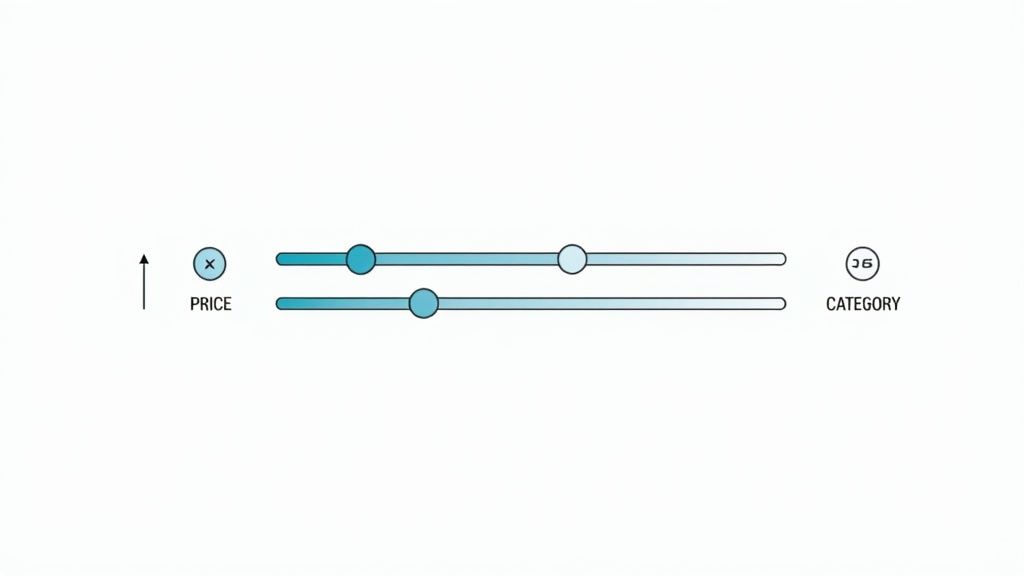Facebook Marketplace Alerts: Stay Updated on Deals
Why Facebook Marketplace Alerts Are Your Secret Weapon

Let's be real—mindlessly scrolling through Facebook Marketplace hoping to stumble upon a great deal can feel like looking for a needle in a digital haystack. The casual browser might get lucky once in a while, but serious deal hunters, flippers, and collectors play a different game. Their success isn't about luck; it's about having a system. Setting up Facebook Marketplace alerts is the single most powerful way to give yourself an edge.
The Unfair Advantage of Timing
On Marketplace, timing isn't just a factor; it's everything. The best deals, whether it's underpriced furniture or a rare collectible, are often claimed within minutes of being posted. If you're just checking the site manually a few times a day, you're already behind. An alert system pushes you to the front of the line, notifying you the second a listing that fits your exact needs goes live.
Imagine you're hunting for a vintage mid-century modern dresser. Someone lists one for a fraction of its real value, simply because they don't know what they have. An automated alert pings your phone instantly. You can be the first person messaging the seller while dozens of other potential buyers are still totally unaware the item even exists. This is how seasoned shoppers consistently score incredible finds. They aren't just faster; they're working on an entirely different timeline.
Escaping the Competition
The sheer scale of Marketplace is immense. It has become a powerhouse in social commerce, with up to 40% of Facebook's 3.07 billion monthly active users shopping on the platform as of early 2025. This means you're up against millions of other local buyers. You can dig deeper into these trends and discover more insights about Marketplace's reach on capitaloneshopping.com.
Alerts help you slice through all that noise. Instead of wading into the crowd, you get a personal, VIP notification. By defining exactly what you're looking for—from keywords and price range to location—you filter out 99% of the listings that don't matter to you. This changes your search from a passive scroll into a proactive, targeted hunt. Our complete Facebook Marketplace alerts guide breaks down even more strategies to build a system that finds the deals for you.
Setting Up Facebook's Built-In Notification System
While third-party tools give you a serious edge, getting the hang of Facebook's own alert system is the perfect place to start. Most people just tap "save search" and call it a day, but the real advantage comes from fine-tuning the details before you save. This is what separates the pros from the casual browsers.
Instead of a broad search like "wood table," you need to get much more specific. For example, a search for "solid oak dining table" with a price limit of $200 and a 15-mile radius will give you much better results. The trick is to think like the person listing the item. What casual terms would they use? Add those to your search. This simple change in mindset cuts down on the irrelevant junk and makes sure your alerts are actually useful. You can learn more about these details by reading our guide on how to properly set up Facebook Marketplace alerts.
Optimizing Your Notification Settings
Once you've crafted the perfect search, you need to decide how Facebook will notify you. The platform gives you a few options, and picking the right one is key to responding quickly and snagging the deal.
To help you decide, let's compare the different alert types and see where each one shines. This table breaks down which notification method works best depending on your goals.
| Alert Type | Best For | Response Time | Customization Level |
|---|---|---|---|
| Push Notifications | Time-sensitive deals (e.g., free items, underpriced tech) | Instant | Medium (uses saved search filters) |
| In-App Notifications | Active, casual browsing throughout the day | Near-Instant | Medium (uses saved search filters) |
| Email Alerts | Less urgent searches, daily deal summaries | Delayed (can be hours) | Low (often aggregates multiple alerts) |
The key takeaway here is that for competitive items, push notifications are king. They bypass the noise of your social feed and get the information to you immediately.

As you can see, a properly configured alert system means you spend less time searching and more time finding great deals. The precision of your filters directly impacts your success.
Advanced Search Techniques That Actually Work
 Going beyond basic keywords is how you really start to find the hidden gems on Facebook Marketplace. Most people just type in "coffee table" and scroll through the same listings everyone else sees. The real skill is in building searches that catch what others miss, turning your Facebook Marketplace alerts into your secret advantage.
Going beyond basic keywords is how you really start to find the hidden gems on Facebook Marketplace. Most people just type in "coffee table" and scroll through the same listings everyone else sees. The real skill is in building searches that catch what others miss, turning your Facebook Marketplace alerts into your secret advantage.
Think about how actual people list things. They make typos. They use strange wording. A fantastic deal on a "dresser" might be listed as a "chest of drawers" or even misspelled as "dreser." When you create separate alerts for these variations, you boost your chances of finding an item priced way below market value. You can also filter out stuff you don't want. If you're looking for a solid wood desk and are sick of seeing particle board, try a search like "solid wood desk -veneer -laminate." The hyphen is a game-changer; it acts as a negative keyword, telling the algorithm to hide any listings that include those words.
Thinking Like a Seller
The best deals often pop up when people are most likely to post them. I've found that many sellers list items on weekends, especially Sunday evenings, after they've spent the day cleaning out the garage or attic. Setting up more frequent alerts during these peak hours can give you the head start you need to grab a deal before anyone else.
Here are a few of my favorite advanced search tactics to get you started:
- Brand Variations: Don't just search for "West Elm." Also set an alert for "Westelm" to catch listings from people who were in a hurry.
- "Needs Work" Searches: I love looking for terms like "project," "as is," or "needs TLC." These items are almost always priced incredibly low and often just need a simple fix to be resold for a solid profit.
- Urgency Keywords: Create alerts for phrases like "moving sale" or "must go." Sellers using these terms are very motivated to sell fast, which means they're usually more open to negotiation.
Third-Party Tools That Supercharge Your Deal Hunting
While Facebook’s built-in alert system is a decent starting point, relying on it alone is like trying to win a race in a family sedan. To really compete, you need to upgrade to a performance vehicle. That's where dedicated third-party tools come in. Think about it: with over 300 million Americans using Facebook Marketplace, the best deals are gone in a blink. Any edge you can get is a massive advantage. You can find more details on these numbers in this insightful article on tekrevol.com.
Services like Flipify are engineered specifically to beat the lag of native Facebook Marketplace alerts. Instead of getting a notification whenever Facebook's system gets around to it, these apps can scan for new listings as often as every single minute.
Why Go Beyond Facebook's Tools?
The real advantages boil down to two things: speed and precision. A specialized tool gives you features that Facebook simply doesn't offer, which are game-changers for any serious flipper, collector, or bargain hunter.
- Near-Instant Notifications: Get an alert just seconds after an item goes live. This puts you ahead of 99% of other buyers who are stuck waiting on Facebook's slower notifications.
- Advanced Filtering: This is where you can really fine-tune your search. Use negative keywords to exclude things you don't want, search multiple locations at once, and even filter by seller ratings to avoid junk listings with pinpoint accuracy.
- Centralized Management: Instead of wrestling with a bunch of saved searches in the often-clunky Facebook app, you get to manage everything from one clean, organized dashboard.
Let's imagine a real-world scenario. You're on the hunt for a "Herman Miller" chair but are tired of seeing posts for repairs or spare parts. With a third-party tool, you can create a specific alert for "Herman Miller" -repair -parts. This simple command ensures you only get notified about complete chairs, turning a frustrating, passive search into an automated deal-finding machine that works for you.
Fine-Tuning Your Strategy for Consistent Results
 Setting up your initial Facebook Marketplace alerts is a great start, but mastering them is what separates the casual browser from the serious deal hunter. To consistently find winners, you need a smart system that delivers quality opportunities without overwhelming you with notifications.
Setting up your initial Facebook Marketplace alerts is a great start, but mastering them is what separates the casual browser from the serious deal hunter. To consistently find winners, you need a smart system that delivers quality opportunities without overwhelming you with notifications.
A common pitfall is creating too many broad alerts, which just leads to a constant stream of irrelevant notifications. I've found it's much more effective to focus on a handful of highly specific searches. My personal rule is to stick to my top 5 most-wanted items at any given time. Instead of a vague alert for "couch," I'll set one for something like "leather sectional -bonded -peeling" to automatically weed out the low-quality listings I don't want.
Prioritizing Your Alerts
When a few great deals pop up at once, you need to know which one to chase first. Having a mental ranking system is key to making quick, profitable decisions. For me, items I plan to flip for a good margin always get top priority over a simple bargain for personal use. This focus is a core principle for anyone looking to make extra money flipping, as high-margin items are the fastest way to grow your hustle.
The type of deal also dictates your response time. A free item on the curb demands immediate action. In contrast, a pricey piece of designer furniture might allow for a more patient approach, giving you time to chat with the seller and arrange logistics.
To help you decide how to act, consider these different scenarios:
- Lightning-Fast Response: This is for freebies, ridiculously underpriced electronics, or listings with phrases like "must go today." Your only goal is to be the very first person to message them.
- Calculated Response: Use this for high-value goods like solid wood furniture or popular collectibles. Your first message should be polite and show you're a serious buyer, but you have some breathing room.
- Low Priority: These are the "nice-to-have" items. You can afford to watch them for a bit, see if the price drops, and negotiate later if they don't sell right away.
To give you a clearer picture, I've put together a table outlining how I approach different categories. This can help you build your own strategy for different types of finds.
| Item Category | Alert Frequency | Key Filters | Response Strategy |
|---|---|---|---|
| High-Demand Electronics | Instant (Real-time) | -cracked, -icloud lock, -parts | Lightning-Fast: Be the first to message. Have a template ready to express interest and ask about pickup. |
| Furniture (for Flipping) | Every 15-30 minutes | solid wood, mid century, -veneer, -particle | Calculated: Message within the hour. Ask specific questions about condition and dimensions to show you're a serious buyer. |
| Free Curbside Items | Instant (Real-time) | free, curb alert | Lightning-Fast: Drop everything. Message immediately stating you're on your way. Speed is everything. |
| Niche Collectibles | Every hour | Brand names, model numbers, specific styles | Calculated: Respond promptly but take time to verify authenticity. You have more leverage here. |
This table shows that a one-size-fits-all approach doesn't work. By tailoring your alert settings and response strategy to the item category, you can dramatically increase your chances of scoring the best deals without getting burned out.
Troubleshooting When Things Go Wrong
Even the most carefully set up system for Facebook Marketplace alerts can run into problems. It's super frustrating when your notifications suddenly go dark or your searches fill up with junk, but these issues are usually fixable. Knowing how to diagnose them quickly means you won't miss out on that next great deal.
The first place I look when my alerts go silent is my phone's notification settings. It's amazing how often a simple OS or app update can reset permissions without telling you. You'll want to double-check that both the Facebook app and any other tools you use, like Flipify, still have the green light to send you push notifications. A silent alert app isn't much help!
When Your Searches Go Rogue
Another common headache is when a once-perfect search starts pulling in a ton of irrelevant listings. This usually happens when Facebook makes a small change to its search algorithm behind the scenes. When my results get weird, I immediately go back and review my search terms.
- Getting Too Broad: If my alert for "wood chair" is suddenly flooded with ads for firewood and scrap lumber, I'll tighten it up. I might change it to "dining chair" or "armchair" and add negative keywords like
-firewoodto filter out the noise. - Being Too Specific: On the flip side, if a super-niche search stops bringing in any results at all, the algorithm might be getting confused. In this case, I'll try broadening it a little or setting up a few slightly different versions to see which one gets the best results.
It's also a really good habit to back up your most valuable searches. I keep a simple note on my phone with the exact keywords, filters, and price ranges that I know work well. If an alert ever gets deleted by accident or just stops working, I can recreate it in seconds instead of trying to remember my winning formula from scratch. This simple backup has saved me from a lot of frustration more than once.
Your Deal-Hunting Action Plan
Turning casual browsing into a real strategy for finding deals isn't as hard as it sounds. The goal is to build a repeatable system that you can rely on. Let's look at how to build these habits, whether you're just getting started or want to make your current method more effective.
The Daily Checklist for Success
Consistency is your best friend here. The most successful flippers don't just sit back and wait for Facebook Marketplace alerts to pop up; they actively manage their search every single day. Here’s a simple routine you can run through each morning to stay ahead.
- Check Your Overnight Alerts: What deals came in while you were sleeping? Go through any promising listings and fire off initial messages to the sellers. The first message often gets the deal.
- Do a Manual Spot-Check: Take just 5-10 minutes to manually search for your most important keywords. Sometimes the algorithm shows you something an alert missed, or you might stumble upon a new search term worth adding.
- Fine-Tune One Alert: Look at yesterday's results and pick one alert to improve. Getting too much junk? Add a negative keyword. Too quiet? Try expanding the search radius a little. Small, daily adjustments make a huge difference.
This daily habit creates a nice balance. You get the speed of automation mixed with the smart insights that only a human can provide. It keeps your system sharp and the deals flowing.
Tracking Your Wins and Losses
So, how do you know if your alert strategy is actually paying off? You need to track it. A simple notebook or a spreadsheet is perfect for this. For every item you go after, write down the search term that found it, how fast you responded, and what happened (won, lost, or got ghosted).
This log is your secret weapon. After a week or two, you’ll start to see patterns. You might discover that your "moving sale" alerts lead to a deal 90% of the time, but your "antique" alerts are way too crowded. Be honest with yourself. When you know what works and what doesn't, you can focus on the winning strategies and stop wasting time on the losers. This turns your deal-finding from a guessing game into a reliable system.
Want to put this whole action plan on autopilot? Flipify can seriously speed things up with near-instant alerts and powerful filters, making sure you're always the first one in the seller's inbox.